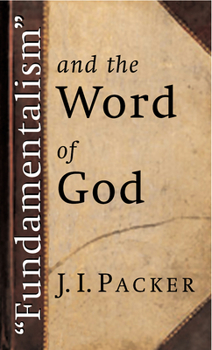Fundamentalism and the Word of God
Select Format
Select Condition 
Book Overview
This modern classic by the author of Knowing God provides a comprehensive statement of the doctrine of Scripture from an evangelical perspective. J. I. Packer explores the meaning of the word "fundamentalism" and offers a clear and well-reasoned argument for the authority of the Bible and its proper role in the Christian life.
Format:Paperback
Language:English
ISBN:0802811477
ISBN13:9780802811479
Release Date:March 1958
Publisher:William B. Eerdmans Publishing Company
Length:191 Pages
Weight:0.43 lbs.
Dimensions:0.5" x 5.3" x 8.3"
Customer Reviews
3 ratings
Standard Resource for Christians
Published by Thriftbooks.com User , 16 years ago
Solid, dependable but dated exposition of the original Fundamentalist position (ala Machen) before the term got stolen and mis-apportioned to a more narrow sect within the Christian community. Packer clearly states that the term is not "useful for Evangelicals today" (1958) and he was and is right. The book is well worth reading, along with Machen's "Christianity and Liberalism" for a strong sense of the basic challenges orthodox, Evangelical Christians face. In the post-modern era those basic challenges are still present though now characterized in different dress. As Packer says (pg. 42)- "The problem of authority is the most fundamental problem that the Christian Church ever faces." Absolutely true and now as much as ever. Packer's work has abiding interest for anyone seeking to establish themselves within the flow of Christian apologetics and self-understanding.
Fundamentalism In A Nutshell
Published by Thriftbooks.com User , 17 years ago
'Human opinion may not compete with divine revelation.' Charles Spurgeon in 'The Scales of Judgment' The author wrote this book, and later distanced himself from these sectarian views. I personally hold fast to much he delivers in this brief. It was his first publication and caused quiet a stir. Fundamentalists are attacked for exactly their uncompromising stance on God's Word having its origin as divinely inspired, and its authoritative nature, whereby all that is good for life and faith is to be received from God's standard in the explicit word of God. Many Christians who distance themselves from Fundamentalists, yet defend the authority of Scripture, are actually standing in one accord with Evangelicalism, a more 'user-friendly' variation thereof. This book is outdated, yet their are timeless truths to the Fundamentalist cause that are fair in its presentation.
Perhaps Oudated, But Solid
Published by Thriftbooks.com User , 21 years ago
JI Packer wrote this book over 45 years ago. Some of the issues he addresses are not issues today. But the premise behind the book is timeless- the authority of the Word of God. Even though liberalism may not be as strong as it was 50 years ago, today Christendom is wandering farther and farther away from the authority of God?s Word. This fact can be seen in the growth of cults. It can also be seen in how Christians today depend on human authors instead of God?s Word. Yet another manifestation of this wrong notion is the branch of Christianity that replaces God?s Word with emotion and feelings. So though the issue of Liberalism may not be significant today, the issue of authority definitely is.I read the book for a class on ?The History of Fundamentalism in America?. The book does not really trace the history of Fundamentalism, but the book does cover the central issue in the Fundamentalism/Liberalism debate. Before reading the book, I would suggest reading the first two pages of the conclusion, where the author gives an overview of the entire book. The book is very logically laid out, with each chapter subject building on top of the last chapter subject. The only chapter I had problems with was the chapter on faith. The author tries to explain man?s inability to express faith, showing the author?s reformed presuppositions. I didn?t understand how this tied into the argument and flow of the book, and I think the notion is unbiblical (but this is a discussion for a different book review). The main argument of the book was one of presuppositions (as found in presuppositional apologetics). On page 109 the author writes, ?We should not abandon faith in anything that God has taught us merely because we cannot solve all the problems which it raises. Our own intellectual competence is not the test and measure of divine truth. It is not for us to stop believing because we lack understanding, or to postpone believing till we can get understanding, but to believe in order that we may understand?? This is the core issue of authority- are we going to trust our own minds, or are we going to trust God?s Word? I would recommend the book to any Christian. The book will challenge you to take on a stronger stance for the Word of God, and it will show the foolishness of doing otherwise.






